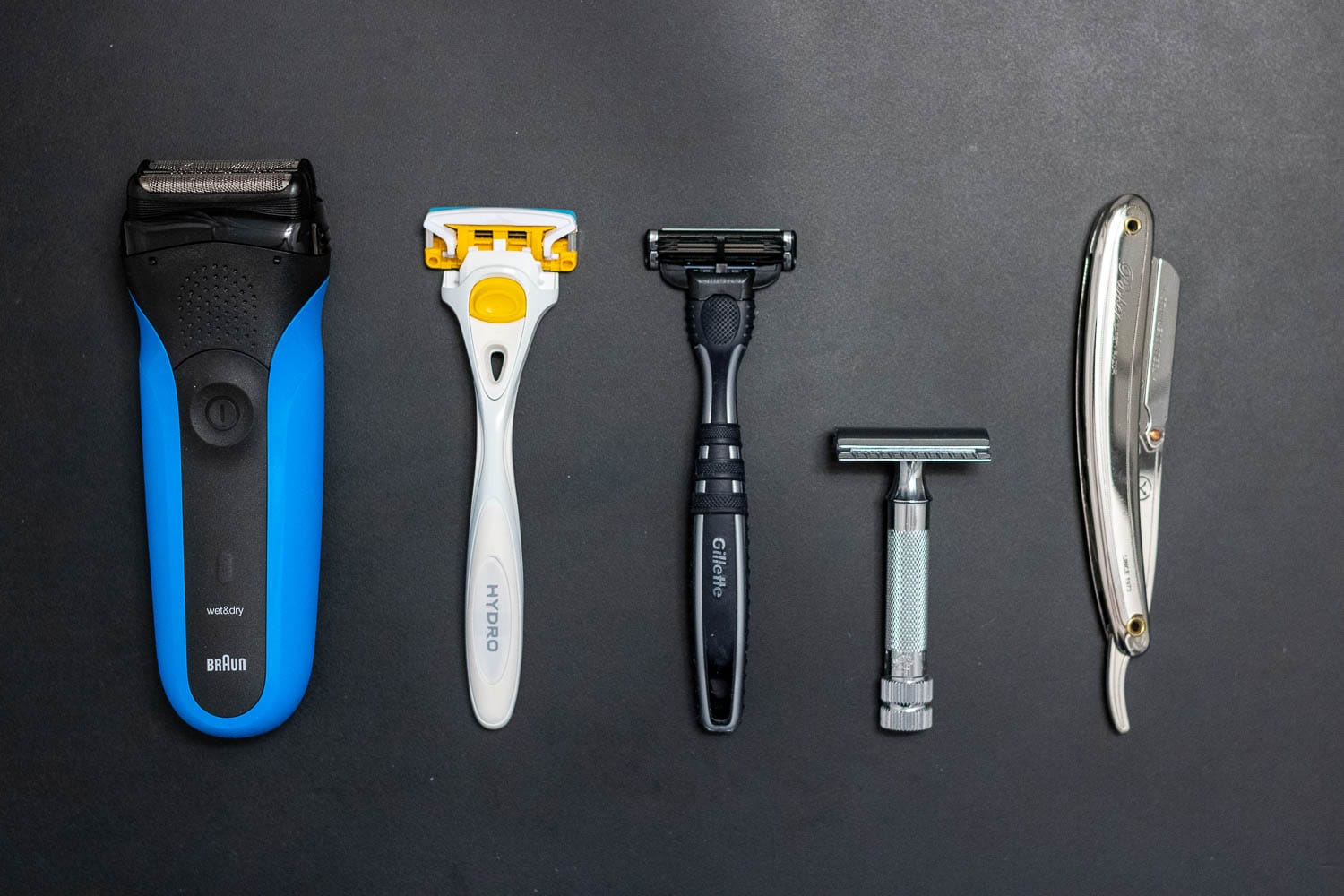Choosing the right razor blade is akin to finding the perfect pair of shoes. Much like shoes, razors should be comfortable, efficient, and well-fitted to your personal needs. However, with the myriad of options available in the market, the process of selection can often be overwhelming.
To streamline this process, we have compiled a list of seven considerations that can guide you in finding the perfect razor blade for your grooming routine.
Quick Comparison
The table below looks at some of the key differences between cartridge razors, safety razors, and electric razors:
| Consideration | Cartridge Razor | Safety Razor | Electric Razor |
|---|---|---|---|
| Shaving Needs | Versatile, suitable for facial and body grooming | Best for facial hair, not versatile | Convenient and fast, designed for either facial or body hair |
| Budget | Low upfront cost, high long-term cost due to replacement blades | High upfront cost, low long-term cost due to inexpensive blades | High upfront cost, low maintenance cost |
| Portability | Travel-friendly | Not allowed on carry-on luggage | Travel-friendly |
| Efficiency | Offers a close shave in just one or two passes | Offers a close, precise shave | Efficient and fast, no need for water or shaving cream |
| Aggressiveness | Can range from two blades to six, more blades can cause razor burn or cuts | Aggressiveness is determined by the gap between the blade and the safety bar | Less aggressive than other types, gentle on skin |
| Brand Reputation | Brands like Gillette and Schick are popular | Brands like Merkur and Muhle are known for high-quality | Brands like Philips and Braun are reputable and offer a wide range |
| Environmental Impact | Produces a lot of plastic waste | More sustainable, less waste, blades can be recycled | Uses electricity but produces less waste, lasts for several years with proper maintenance |
1. Shaving Needs

The first step in choosing a razor is determining your shaving needs. What areas of the body do you intend to shave? Do you need a razor for facial hair, body hair, or the pubic region? Maybe you need a multifaceted tool that can handle all of these tasks.
Understanding your personal requirements can help steer you towards the type of razor that suits you best, whether it’s a safety razor, cartridge razor, or an electric one.
For all-around grooming, the cartridge razor is often a popular choice due to its versatility. Brands like Gillette and Schick offer multiple-blade cartridge razors designed to provide a close and smooth shave, making them suitable for both facial and body grooming.
Safety razors work well for facial hair use and are known for delivering a close, precise shave.
Brands like Merkur and Muhle are known in the market for their high-quality safety razors. However, they lack versatility, especially when it comes to shaving the head, groin, underarms, or other challenging body parts.
For those who prioritize convenience and speed over precision, electric razors may be the best bet. They can provide efficient and quick shaves without the need for water or shaving cream. Brands like Philips and Braun have been leading in this category for years, offering models specifically designed for either facial hair or body hair.
2. Budget

The cost of a razor blade is also a significant factor to consider. The upfront cost of a razor can vary widely, with some high-end models costing up to several hundred dollars.
While cartridge razors have a low introductory price, the long-term costs of the blades quickly outpace the initial savings. Each replacement cartridge will average around $4 each, which can quickly accumulate over time, especially for frequent shavers.
On the other hand, safety razors require a larger initial investment (roughly around $50), but the recurring cost of the blades is significantly less than cartridges. Many safety razor blades cost around $0.10 each, drastically reducing the long-term expense.
Electric razors fall somewhere in between. They require a higher upfront investment, potentially up to a couple of hundred dollars for premium models. However, maintenance costs are relatively low compared to cartridge razors.
3. Portability
If you’re a frequent traveler, the portability of your razor is a key consideration. Some razors are compact and travel-friendly, while others may require special handling or storage.
Safety razor blades and straight razors aren’t allowed on carry-on, whereas cartridge and electric razors are generally more travel-friendly.
4. Efficiency
Efficiency in a razor refers to how quickly and effectively it delivers the desired results. If you’re often in a rush, a razor that offers a close shave in just one or two passes might be the best fit for you.
Cartridge razors, double edge safety razors, and electric shavers can deliver equally efficient results for facial hair shaving once you are accustomed to their use.
Straight razors are best suited for those men looking for a more leisurely and traditional shaving experience, where time isn’t a factor. However, they do require a certain level of skill and practice to use effectively.
5. Aggressiveness
The aggressiveness of a razor refers to the closeness of the shave, the sharpness of the blade, and how your skin reacts to it.
Each type of razor system will have ranges of aggressiveness within their product lines. For example, cartridge razors can range from two blades to six, increasing the possibility of razor burn or cuts but also providing a closer shave. Similarly, safety razors also come in different levels of aggressiveness, determined by the gap between the blade and the safety bar.
If you have sensitive skin, you typically want fewer blades (for cartridge razors) or a safety razor with a smaller blade gap. This will reduce the likelihood of skin irritation and the development of ingrown hairs. On the other hand, if you have tough, coarse hair and aren’t prone to sensitive skin, a more aggressive razor may be more effective.
It’s critical to note that jumping into the use of highly aggressive razors without any experience can lead to cuts and razor burns. Therefore, beginners might want to start with less aggressive models and gradually move up as they gain confidence and skill.
6. Brand Reputation
The reputation of the brand can also influence your choice of razor. Certain brands are known for their high-quality products and longevity. While they get plenty of criticism, Gillette delivers reliable and innovative products, and they have been a dominant force in the shaving industry for decades.
Brands like Merkur, Edwin Jagger, and Muhle are well-known for their high-quality safety razors. In the electric shaver segment, companies like Braun, Philips, and Panasonic are reputable names offering a wide range of models to suit different needs and budgets.
Furthermore, customer reviews and ratings can give you insight into the efficiency, longevity, and overall performance of the razor you’re considering. Make sure to do your research before making a purchase.
7. Environmental Impact
With men more aware than ever when it comes to the environmental impact of their consumption habits, the type of razor you choose can have a significant effect on the environment.
Disposable razors and cartridge razors, while convenient and often low-cost, produce a great deal of plastic waste. According to a report by the Environmental Protection Agency, over two billion disposable razors end up in landfills each year in the U.S. alone.
Safety razors, on the other hand, are a more sustainable option. Featuring a metal handle and replaceable blades, safety razors generate far less waste than their disposable counterparts. The handle can last a lifetime if properly cared for, and the blades can be recycled.
Electric razors are also a more environmentally friendly choice. While they do use electricity, the energy they consume is relatively low. Also, since they last for several years with proper maintenance, they produce less waste.
I’m a primarily interested in shaving the upper lip area, though I would also appreciate being able to shave my underarms. I care a lot about the environmental impact. I’m not sure what my skin sensitivity is, which makes me nervous about selecting razors with higher aggressiveness. Is it worth investing in a safety razor?